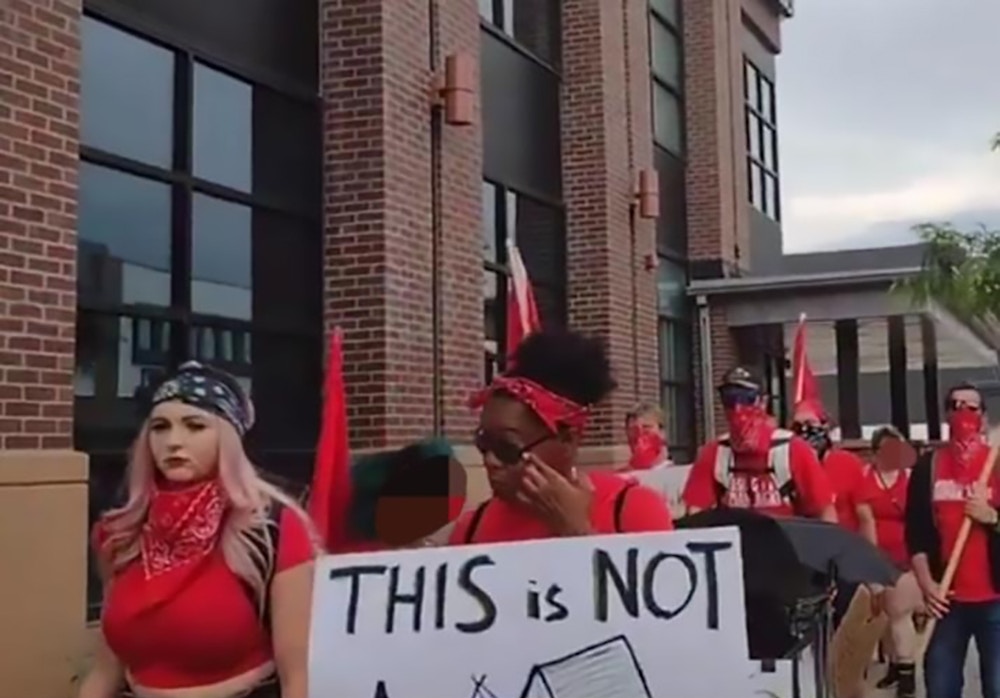THE YOUNG WOMAN with long pink hair claimed to be from Washington state. One day during the summer of 2020, she walked into the Chinook Center, a community space for left-wing activists in Colorado Springs, Colorado, and offered to volunteer.
“She dressed in a way that was sort of noticeable,” said Samantha Christiansen, a co-founder of the Chinook Center. But no one among the activists found that unusual or alarming; everyone has their own style. They accepted her into the community.
The pink-haired woman said her name was Chelsie. She also dropped regular hints about her chosen profession.
“She implied over the course of getting to know her that she was a sex worker,” said Jon Christiansen, Samantha’s husband and another co-founder of the Chinook Center.
“I think somebody else had told me that, and I just was like, ‘Oh, OK. That makes sense,’” said Autum Carter-Wallace, an activist in Colorado Springs. “I never questioned it.”
But Chelsie’s identity was as fake as her long pink hair. The young woman, whose real name is April Rogers, is a detective at the Colorado Springs Police Department. The FBI enlisted her to infiltrate and spy on racial justice groups during the summer of 2020.

April Rogers, left, a police officer who went undercover for the FBI in the Colorado Springs activist community, participating in a housing-rights march during which several activists were arrested.
Photo courtesy of Chinook Center.
As the FBI’s Colorado Springs investigation reveals, Denver wasn’t the only city where federal agents infiltrated racial justice groups that summer. Working through the Joint Terrorism Task Force, a partnership with local police, the FBI assembled files on local activists using information secretly gathered by Rogers.
Once Rogers gained trust among the activists, she tried to set up at least two young men in gun-running conspiracies. Her tactics mirrored those of Windecker, who tried to entrap two Denver racial justice activists in crimes, including an FBI-engineered plot to assassinate Colorado Attorney General Phil Weiser that went nowhere.
To reveal what happened in Colorado Springs, I obtained search warrant applications, body-camera video from local police assisting the FBI investigation, and recordings of conversations involving federal agents; reviewed hundreds of pages of internal FBI records about Social Media Exploitation, a program federal agents used to monitor racial justice activists nationwide; and interviewed about a dozen activists who were targeted in the federal probe.
For her part, April Rogers won’t say anything. When called as a witness in a state court hearing, she testified that the Justice Department instructed her not to answer questions about the FBI investigation. “I’ve been told to respond, ‘I respectfully decline to answer,’” Rogers said under oath. The Colorado Springs Police Department declined to make her available for an interview.
This FBI investigation in Colorado Springs, 70 miles south of Denver, shows that federal law enforcement had embarked on a broad, and until now, secret strategy to spy on racial justice groups and try to entrap activists in crimes. “It’s disturbing, but not surprising, to learn the FBI’s reported targeting of racial justice activists in 2020 wasn’t limited to Denver,” Sen. Ron Wyden, D-Ore., told The Intercept. “It is a clear abuse of authority for the FBI to use undercover agents, informants, and local law enforcement to spy on and entrap people engaged in peaceful First Amendment-protected activities without any evidence of criminal activity or violent intent.”
The probe in Colorado Springs also raises questions about FBI priorities and the bureau’s perceptions of threats. As federal agents investigated political activists there, they also launched, and promptly dropped, an investigation of a man running a neo-Nazi website — a decision that would have deadly consequences.








